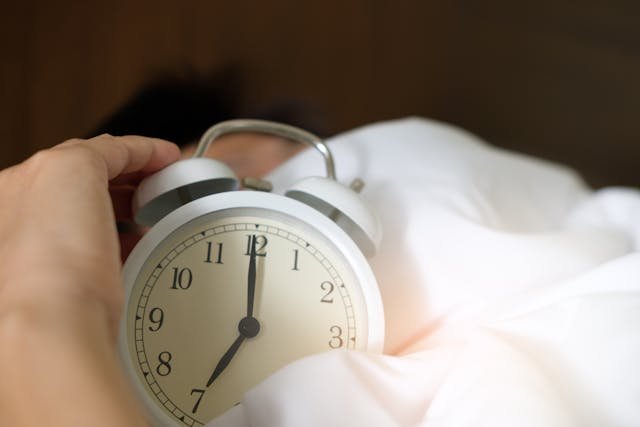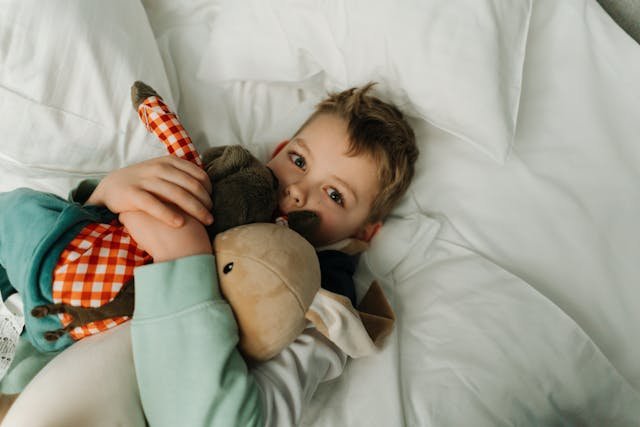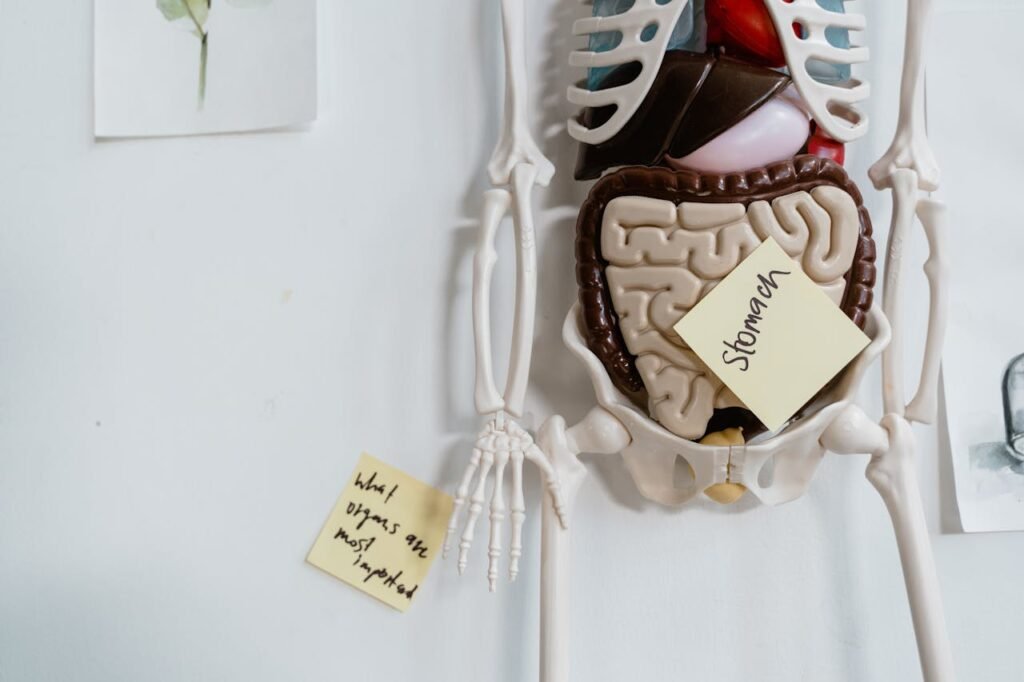Every night, when you close your eyes, something amazing happens inside your body. You may think you’re “doing nothing” while you sleep—but your body is actually very busy.
As you dream, your brain is sorting out memories, your muscles are repairing themselves, and your bones are quietly growing. Sleep isn’t just rest—it’s fuel for your body and mind.
But why do we need sleep so badly? What really happens when we drift off? And why do kids and teens need more sleep than adults?
In this article, we’ll take a simple, step-by-step journey into the world of sleep. You’ll see how it works, why it matters, and what happens if we don’t get enough of it. By the end, you’ll understand that sleep isn’t wasted time—it’s one of the most important parts of being healthy and growing strong.
What Sleep Really Is
When you go to bed at night and close your eyes, it might feel like nothing is happening. Your body is still, your eyes are shut, and the world grows quiet. But inside you, something amazing is taking place. Sleep is not about doing “nothing.” It is about your body and brain switching into a different mode—a mode where repair, growth, and memory-building happen.
Think of it like plugging in a phone or laptop at night. From the outside, it looks like it’s off. But on the inside, the battery is charging, updates are being installed, and everything is preparing for the next day. Sleep does the same for you.
The Brain at Night
Your brain never truly “sleeps.” Even when you’re dreaming, it’s busy at work. During the night, your brain moves through different stages, like chapters in a story.
- Light Sleep – This is when your body starts to relax. Your breathing slows down, your muscles loosen, and your heart rate calms. It’s like your body dipping its toes into rest.
- Deep Sleep – This stage is the powerhouse of your night. Here, your brain takes a break while your body does its repair work. Muscles heal from all the running, jumping, or sports you did during the day. Your bones and tissues rebuild themselves. Even your immune system—the superhero that protects you from germs—gets stronger.
- Dream Sleep (REM Sleep) – In this stage, your brain becomes very active again. You dream, sometimes about things that happened that day, and sometimes about things that make no sense at all. But dreams have a purpose: they help your brain organize memories, solve problems, and even practice skills. For example, if you learned to ride a bike, your brain “replays” that memory at night to make it stick.
So, while you think you’re resting, your brain is actually filing papers, cleaning up the desk, and sharpening its pencils for the next day.
The Body at Night
While the brain organizes, the body repairs.
- Muscles: All that running, climbing, and stretching can cause tiny tears in muscles. At night, your body fixes them, making your muscles stronger.
- Bones: For kids and teens, sleep is when growth hormones are released. That’s why children need more sleep than adults—your bodies are still building up, not just keeping steady.
- Immune System: Imagine tiny soldiers inside you. At night, they recharge, ready to fight off germs when you wake up. That’s why when you’re sick, you feel more tired—your body is demanding more sleep to heal.
Your body is like a construction site at night. Workers (cells) are fixing damages, building new structures, and clearing away waste.
Why Sleep Comes in Cycles
Sleep is not one long stretch of the same thing. It comes in cycles. Each cycle lasts about 90 minutes and moves through light sleep, deep sleep, and dream sleep. Then the cycle starts again.
By the time you wake up, you’ve gone through four to six of these cycles. It’s as if your brain and body say:
- “First cycle: do some repairs.”
- “Second cycle: build memory.”
- “Third cycle: grow stronger.”
And so on—until all jobs are done.
That’s why a full night’s sleep is so important. If you cut it short, you’re stopping your body before it’s finished all its work.
Sleep Is Not Lazy—It’s Smart
Sometimes kids think sleeping is boring or that staying up late is more fun. But the truth is, sleep is one of the smartest choices you can make. Without it:
- Your brain has trouble focusing.
- Your body feels weak or clumsy.
- Your emotions feel heavier—you get cranky, upset, or sad more easily.
Sleep is your invisible helper, quietly working while you rest. It prepares you to wake up refreshed, alert, and ready for a brand-new day.
Why We Need Sleep

Sleep isn’t just something we “should” do. It’s something our body must do to survive. Just like food and water, sleep is fuel. Without it, your body and mind can’t work properly.
Think of sleep as your body’s reset button. Each night, it gives you a fresh start for the next day. But let’s go deeper—what exactly does sleep do for us?
Sleep Helps the Brain Think Clearly
Have you ever noticed how hard it is to focus when you’re tired? That’s because your brain needs sleep to organize and recharge.
- During sleep, your brain sorts through everything you saw, heard, and learned that day. It keeps what’s important and deletes what’s not.
- It strengthens your memory—like saving files on a computer. Without sleep, those files don’t get saved properly, and you forget things more easily.
- Sleep also boosts creativity. That’s why people sometimes wake up with answers to problems they couldn’t solve the day before.
In short: a good night’s sleep makes your brain sharp, focused, and ready to learn.
Sleep Repairs and Builds the Body
While your brain is filing away memories, your body is busy fixing itself.
- Muscles and tissues repair damage caused by play, sports, or even daily movement.
- Growth hormones are released, which is especially important for kids and teens. Sleep literally helps you grow taller and stronger.
- Your heart and blood vessels also rest and repair, keeping your circulation system healthy.
That’s why athletes and dancers make sure to sleep well—it’s their secret weapon for strength and recovery.
Sleep Strengthens Your Immune System
Your immune system is like an army that defends you from bacteria and viruses. But just like an army, it needs rest to stay strong.
- When you sleep, your body produces more infection-fighting cells and proteins.
- Without enough sleep, your defenses weaken, making you more likely to catch a cold or flu.
That’s why when you’re sick, your body makes you feel extra sleepy—it’s asking for more time to heal.
Sleep Balances Your Emotions
Lack of sleep doesn’t just make you yawn—it makes you cranky. When you don’t get enough rest, your brain struggles to handle emotions.
- You might feel more upset, angry, or sad.
- Small problems feel much bigger.
- You have less patience and less control over your reactions.
On the other hand, when you’re well-rested, you feel calmer, happier, and more confident. Sleep helps you handle stress and enjoy your day with a clearer mind.
Sleep Restores Energy
Every cell in your body uses energy all day. Sleep is when that energy is recharged. It’s like plugging in a drained battery overnight.
- Your brain’s “batteries” get refilled.
- Your muscles regain strength.
- Even your skin cells refresh, which is why you often look healthier after a good night’s sleep.
Without this recharge, your body feels slow, clumsy, and tired.
So, why do we need sleep? Because it keeps us smart, strong, healthy, and happy. It’s not wasted time—it’s essential time.
What Happens When We Don’t Get Enough Sleep

Missing sleep doesn’t just make you a little tired—it affects almost every part of your body and mind. Think of sleep like the fuel your body runs on. If you skip it, it’s like trying to drive a car on an empty tank. You might move a little at first, but soon everything slows, stumbles, and eventually stops working well.
Let’s look at the different ways a lack of sleep affects you.
Trouble Thinking and Learning
The brain is one of the first places to feel the effects of lost sleep.
- Memory weakens: When you don’t sleep enough, your brain struggles to store information. It’s like trying to save a school project on a computer that keeps shutting down—you lose pieces of it.
- Focus drops: In class, you may feel your eyes open but your mind drifts away. Teachers call your name, but you don’t even hear it.
- Problem-solving slows: Even easy math problems or puzzles feel harder when your brain is foggy.
That’s why students who stay up late to study often do worse on tests—they can’t recall what they tried to memorize. Sleep is actually part of learning.
Mood Swings and Emotions
Have you noticed how everything feels worse when you’re tired? That’s because lack of sleep affects the part of your brain that controls emotions.
- Irritability: Small things—like someone bumping into you—feel like a big deal.
- Sadness or worry: Without enough sleep, your brain has less patience and less balance, making you more likely to feel down or anxious.
- Short temper: You may snap at friends or family more quickly.
In short, sleep helps you handle emotions. Without it, it’s like walking around with no emotional filter.
Weak Immune System
Your immune system is like a superhero army fighting off germs. But soldiers need rest, too.
- Without enough sleep, your body makes fewer infection-fighting cells.
- That means viruses and bacteria get a better chance to make you sick.
- Even small cuts or scrapes can take longer to heal.
This is why people who are constantly sleep-deprived catch more colds and recover more slowly.
Slower Body, Less Energy
Your body feels the lack of sleep, too.
- Low energy: You drag your feet, feel heavy, and don’t want to move much.
- Clumsiness: You might trip, drop things, or move more awkwardly.
- Poor sports performance: Whether running, dancing, or playing soccer, everything feels harder without sleep.
Athletes know this very well—sleep is as important as training. Without it, muscles don’t recover, reaction times slow, and the body feels weaker.
Growth and Development Problems
For kids and teens, sleep isn’t just about rest—it’s about growth. Sleep is when the body releases growth hormones that help bones, muscles, and tissues develop.
- Without enough sleep, children may grow more slowly.
- Teens may feel more exhausted, especially during busy school and sports schedules.
- Learning new skills becomes harder when the brain hasn’t had time to recharge.
In other words, sleep is part of growing up strong. Missing it means missing out on that invisible but powerful growth process.
Long-Term Effects
Missing one night of sleep makes you tired. But missing sleep often—night after night—can have much bigger effects. Over time, it can lead to:
- Heart problems
- Obesity (because lack of sleep changes how your body uses food)
- Diabetes
- Constant fatigue that makes life harder in every way
The good news is: the body can recover. When you start getting good, regular sleep, your energy, focus, and health bounce back.
So, what happens when we don’t get enough sleep? Our brains forget, our moods wobble, our immune system weakens, and our bodies slow down. Sleep is not just about rest—it’s the secret fuel that keeps every part of us working properly.
How Much Sleep Do We Really Need?

Sleep is not one-size-fits-all. Just like plants need different amounts of sunlight depending on their stage of growth, people need different amounts of sleep depending on their age. Babies, kids, teens, and adults all have unique needs because their bodies and brains are at different points in development.
Here’s what that looks like, step by step:
Babies and Toddlers: The Sleep Giants
Babies are like little building projects in progress. Their bodies and brains are growing at an astonishing rate. That’s why newborns sleep the most—about 14 to 17 hours a day.
Even toddlers, who seem full of endless energy, still need 11 to 14 hours of rest. Naps are part of their daily routine because without them, their tiny bodies would wear out too quickly.
During these long hours of sleep:
- Their brains are building new connections at lightning speed.
- Their immune systems are strengthening.
- Growth hormones are working overtime.
Every nap, every long night’s sleep, is like pouring fuel into the engine of growth.
Children: Growing Minds and Bodies
By the time kids reach school age (6–12 years old), they need around 9 to 12 hours of sleep each night.
This is the stage where their brains are learning fast—math, reading, sports, social skills. Every lesson needs to be stored in memory, and sleep is where that storing happens.
Without enough sleep, kids might:
- Struggle to pay attention in class.
- Forget what they learned the day before.
- Be more moody or impatient.
Sleep is the hidden partner of school success. A child who rests well is sharper, calmer, and more ready to take on new challenges.
Teenagers: The Sleep Strugglers
Teenagers need 8 to 10 hours of sleep each night. But here’s the problem—many don’t get it. Between homework, sports, friends, and late-night phone scrolling, teens often sleep less than they should.
The teen body is still growing rapidly. Sleep fuels that growth, strengthens bones and muscles, and balances emotions. Without it:
- Teens may feel constantly tired.
- School performance drops.
- Mood swings get worse.
- Growth can even slow down.
Parents often think teens are “lazy” when they want to sleep in, but in truth, their bodies are asking for what they genuinely need. Sleep for teens isn’t a luxury—it’s a requirement for healthy development.
Adults: Maintenance Mode
Adults usually need 7 to 9 hours of sleep. They’re not growing taller anymore, but their bodies are still busy repairing, refueling, and protecting health.
For adults, proper sleep:
- Keeps memory sharp.
- Protects the heart and blood vessels.
- Reduces stress and helps balance weight.
- Boosts mood and energy for work and family life.
Without it, fatigue sets in, health risks increase, and even small tasks feel overwhelming.
Older Adults: Changing Patterns
As people age, they may need slightly less sleep—around 7 to 8 hours—but the quality of sleep matters more than ever. Older adults often wake up more during the night, but restful, deep sleep is still essential for memory, healing, and emotional balance.
It’s Not Just About Hours—It’s About Quality
A person can stay in bed for 10 hours but still feel tired if the sleep is restless. Quality sleep means moving smoothly through the cycles of light sleep, deep sleep, and dream sleep. That’s when the real repair and memory work happens.
Signs you’re getting good sleep:
- You wake up feeling refreshed.
- You have steady energy through the day.
- You don’t constantly crave naps.
So, how much sleep do we need? Enough for our age, but also enough to let the body and brain finish their full night of work. For kids and teens, that usually means early bedtimes and fewer late-night distractions—choices that pay off with better learning, growth, and happiness.
How to Sleep Better: Simple Habits That Work

Good sleep doesn’t just “happen.” It’s something we can encourage with smart habits. Think of it like planting a seed. If you give the seed sunlight, water, and healthy soil, it grows strong. If you give your body the right conditions, sleep will come easier and feel more refreshing.
Here are some powerful but simple habits that make a huge difference:
1. Stick to a Regular Bedtime
Your body loves rhythm. If you go to bed at the same time every night, your body learns when it’s “sleep time.” Soon, you’ll feel sleepy right on schedule.
Kids who have regular sleep routines usually fall asleep faster and wake up happier. On the other hand, if bedtime keeps changing, your body feels confused—like a clock that’s always running late.
Tip: Pick a bedtime that gives you enough hours of sleep for your age (kids: 9–12 hours, teens: 8–10 hours, adults: 7–9 hours) and stick to it—even on weekends.
2. Limit Screens Before Bed
Phones, tablets, and TVs give off a special kind of light (blue light) that tricks your brain into thinking it’s still daytime. That makes it harder to fall asleep.
If you’ve ever stayed up late scrolling or watching videos and then found yourself wide awake in bed, that’s why.
Try turning off screens at least 30–60 minutes before bedtime. Instead, read a book, listen to calm music, or talk with family. Your brain will thank you by slipping into sleep more easily.
3. Watch What You Eat and Drink
Food and drinks can affect your sleep.
- Caffeine (in coffee, soda, or even chocolate) keeps the brain awake. That’s why it’s best to avoid it in the late afternoon or evening.
- Heavy meals right before bed make your body work hard to digest, which can keep you restless.
- Drinking too much liquid before bed may wake you up in the night to use the bathroom.
The best bedtime snack? Something light—like fruit, yogurt, or a warm glass of milk.
4. Create a Relaxing Routine
Your brain needs signals to know it’s time to wind down. A bedtime routine tells your body, “We’re preparing for rest now.”
Some calming ideas:
- Take a warm shower or bath.
- Read a few pages of a story.
- Do some gentle stretches.
- Practice deep breathing.
Repeating these steps every night helps your brain shift from “day mode” to “sleep mode.”
5. Make Your Room Sleep-Friendly
Your bedroom environment plays a huge role in how well you sleep.
- Keep the room cool and dark—our bodies naturally sleep better that way.
- Use comfortable pillows and blankets.
- Reduce noise if possible. (Some kids like soft background sounds, like a fan or white-noise machine.)
- Keep the bed for sleep, not for games, homework, or TV. That way, your brain associates it only with rest.
6. Get Sunlight and Activity During the Day
The better your day, the better your night. Spending time in natural sunlight helps regulate your internal clock, so your body knows when it’s time to be awake and when it’s time to sleep.
Physical activity—like playing outside, sports, or even dancing around your room—also helps. Kids who move more during the day usually fall asleep faster at night.
7. Calm Your Mind
Sometimes, kids (and adults) can’t sleep because their minds are racing with thoughts. Worries, excitement, or even random ideas can keep you awake.
One helpful trick is journaling. Write down your thoughts before bed to “unload” your brain. Another is breathing slowly, focusing only on your breath, until your body relaxes.
Good sleep is like a gift you give yourself every night. With the right habits, you’ll fall asleep more easily, stay asleep longer, and wake up ready to take on the world.
The Science of Dreams: Why We Dream and What It Means

One of the most mysterious parts of sleep is dreaming. Every night, as your body rests, your brain tells you strange stories—some funny, some scary, some so realistic you wake up wondering if they really happened. But why do we dream at all?
When Do Dreams Happen?
Dreams happen mostly during a special stage of sleep called REM sleep (Rapid Eye Movement sleep). In this stage, your eyes move quickly under your eyelids, your brain becomes very active, and your body stays relaxed.
Scientists call it “dream sleep” because this is when the wildest and most vivid dreams occur. You may also dream a little in other sleep stages, but REM is the most powerful one.
Dreams and Memory
One big reason we dream is because the brain is organizing information.
- Imagine your brain as a library. Every day you add new books—new memories, lessons, and experiences.
- At night, your brain is the librarian, putting books on the right shelves.
- Dreams are like snippets of that sorting process—flashes of pictures, feelings, and memories.
That’s why you might dream about things you saw, read, or thought about during the day.
Dreams and Creativity
Dreams don’t always make sense, but they can spark creativity. Artists, musicians, and even scientists have gotten ideas from dreams.
For example:
- The famous inventor Thomas Edison often took short naps and sometimes woke up with new solutions.
- A scientist named Kekulé dreamed about snakes biting their tails—and from that dream, he figured out the structure of a chemical called benzene.
So, dreams can be the brain’s way of experimenting, mixing ideas, and creating something new.
Dreams and Feelings
Dreams also help you deal with emotions. If something made you worried, sad, or excited during the day, your brain might replay it in your dreams to “process” the feeling.
That’s why:
- You may dream of winning a game if you’ve been practicing hard.
- You may dream of failing a test if you’ve been anxious about school.
- You may dream about someone you miss, as your brain tries to comfort you.
Dreams can be like emotional rehearsals—safe places where your brain works through big feelings
Nightmares
Sometimes dreams turn scary—those are nightmares. Nightmares can come from stress, fear, or even something you saw in a movie. They may feel overwhelming, but they’re also your brain’s way of “testing” how you handle danger.
The good news? Nightmares don’t harm you. Once you wake up, they’re gone. And the more you talk about them, the less scary they feel.
So, Why Do We Dream?
Scientists are still studying this question, but most agree dreams help with:
- Organizing memories
- Processing emotions
- Boosting creativity
- Preparing us for real-life challenges
Dreams remind us that the brain never really rests. Even when the body is still, the mind is exploring, learning, and healing.
Sleep and Growth: Why Kids and Teens Need More Rest
If adults need sleep to repair and recharge, kids and teens need it even more. That’s because their bodies aren’t just repairing—they’re still building. Every night of sleep is like another layer added to the foundation of a strong, healthy body and mind.
Kids: Building the Basics
For younger children, sleep is when growth happens in the most literal sense. While they rest:
- Growth hormones are released, which help bones lengthen, muscles strengthen, and tissues develop.
- Their brains form new connections at lightning speed, building the foundation for learning, memory, and problem-solving.
- Their immune systems become stronger, preparing them to fight off the everyday colds and infections they encounter.
That’s why a tired child may not just be cranky—they may also be missing out on important growth opportunities.
Teens: The Busy Builders
Teenagers often feel like their bodies are changing overnight—and in a way, they are. Puberty brings huge physical and emotional changes, and sleep is the fuel that makes it possible.
During sleep:
- Hormones that regulate growth and development are at their peak.
- Muscles and bones recover from rapid physical growth and sports activities.
- The brain processes the stress and emotions of teenage life, helping teens stay balanced.
But here’s the problem: teens often sleep less than they need. Late-night studying, social media, and busy schedules mean many teens are running on too little rest. Over time, this lack of sleep can lead to:
- Mood swings
- Struggles with focus and grades
- Slower growth
- Increased risk of anxiety or depression
Sleep isn’t wasted time for teens—it’s the building block of health and maturity.
Emotional Growth
It’s not just the body that grows during sleep. Emotional growth happens, too.
- Sleep helps kids and teens regulate their emotions. Without it, small frustrations can turn into big meltdowns.
- Well-rested kids are more patient, confident, and able to bounce back from challenges.
- Teens with enough sleep are less likely to feel overwhelmed, and more likely to handle stress in healthy ways.
Sleep and Performance
Sleep also plays a direct role in how kids and teens perform in daily life.
- In school: better focus, memory, and creativity.
- In sports: stronger performance, quicker reaction times, and faster recovery.
- In friendships: more balanced moods and better communication.
In short: kids and teens who sleep well grow stronger, think clearer, and feel happier.
The Growth Superpower
For children and teenagers, sleep is not just rest—it’s their growth superpower. It’s when their bodies stretch taller, their brains build knowledge, and their emotions learn balance. Missing sleep means missing a chance to grow into the healthiest version of themselves.
Final Thoughts: Sleep Is Your Superpower
Every night when you close your eyes, your body isn’t shutting down—it’s working harder than ever. Your brain is filing memories, your muscles are healing, your bones are growing, and your emotions are finding balance. Sleep is not wasted time—it’s one of the smartest and most important things you can do for your body and mind.
When we don’t sleep enough, we feel it everywhere—foggy thinking, cranky moods, slower learning, weaker health. But when we give our bodies the rest they need, we unlock energy, focus, happiness, and growth.
That’s why sleep is your secret superpower. It’s the invisible helper that makes every part of life better—school, sports, friendships, and even your dreams for the future.
At Debsie, we believe that kids learn best when science feels personal and exciting. That’s why we explain topics like sleep not with complicated words, but with stories, examples, and fun activities that make learning stick. Sleep is just one of the many life-changing subjects we explore with kids every day—helping them grow smarter, healthier, and more confident.
👉 Book a free trial class today
👉 Explore Debsie’s science and STEM courses
Read Next:



